
-
Find the right food for your petTake this quiz to see which food may be the best for your furry friend.Find the right food for your petTake this quiz to see which food may be the best for your furry friend.Featured products
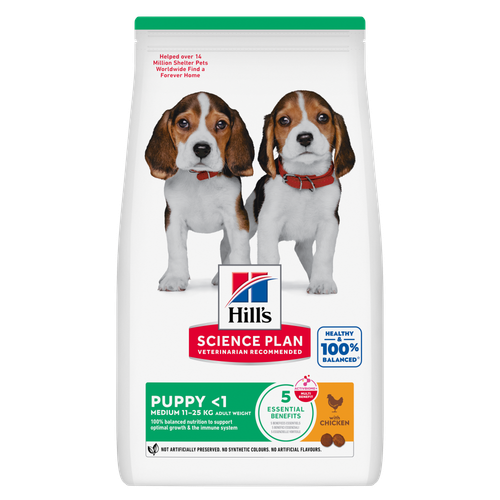 Medium Puppy Food
Medium Puppy FoodHill's Science Plan Puppy Medium Breed Dog Food with Chicken is a complete pet food, specially formulated with ActivBiome+ Multi-Benefit Technology.
100% balanced nutrition to support optimal growth & the immune system.Shop Now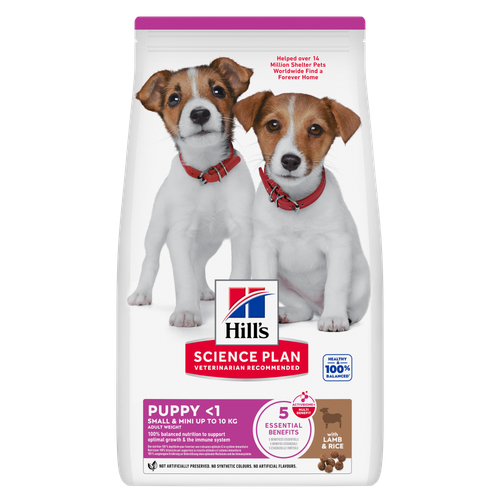 Small & Mini Puppy Food
Small & Mini Puppy FoodHill's Science Plan Puppy Small & Mini Breed Dog Food with Lamb & Rice is a complete pet food, specially formulated with ActivBiome+ Multi-Benefit Technology.
100% balanced nutrition to support optimal growth & the immune system.Shop Now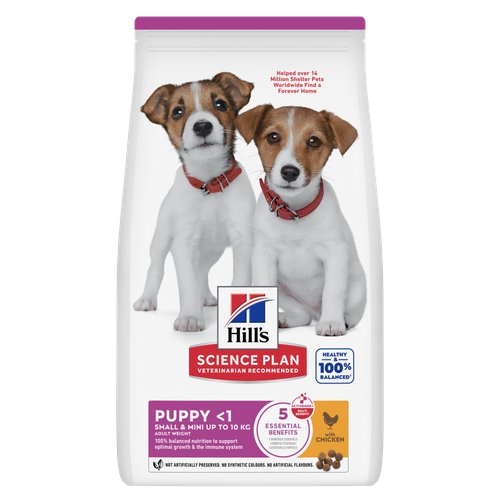 Small & Mini Puppy Dog Food
Small & Mini Puppy Dog FoodHill's Science Plan Puppy Small & Mini Breed Dog Food with Chicken is a complete pet food, specially formulated with ActivBiome+ Multi-Benefit Technology.
100% balanced nutrition to support optimal growth & the immune system.Shop NowFeatured products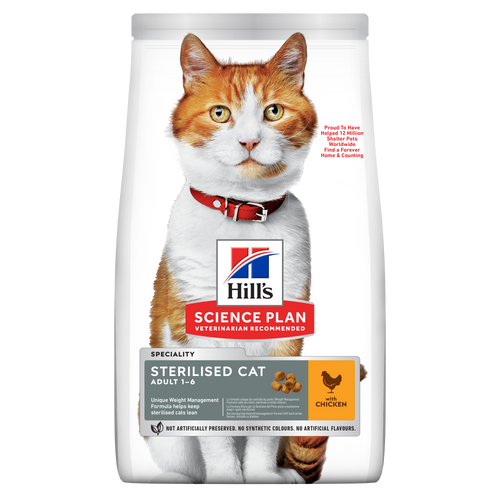 Sterilised Adult Cat Food
Sterilised Adult Cat FoodHill's Science Plan Adult Sterilised Cat Dry Food with Chicken is specially formulated with ActivBiome+ Multi-Benefit Technology. It is a precisely balanced nutrition, tailored to meet the needs of sterilised cats, to help keep sthem lean & healthy.
Shop Now Oral Care Adult Cat Food
Oral Care Adult Cat FoodHill's Science Plan Oral Care Adult Cat Food with Chicken contains clinically proven kibble technology to reduce plaque & tartar build up.
Shop Now Hypoallergenic Dry Cat Food
Hypoallergenic Dry Cat FoodHILL'S SCIENCE PLAN Hypoallergenic Adult cat food with egg & insect protein is a complete pet food for adult cat 1–6 years old. It's formulated for cats with delicate skin and stomach, with limited high quality novel protein sources & no grain.
Shop Now -
Dog
- Dog Tips & Articles
-
Health Category
- Weight
- Food & Environmental Sensitivities
- Urinary
- Digestive
- Joint
- Kidney
-
Life Stage
- Puppy Nutrition
- Adult Nutrition
- Senior Nutrition
Cat- Cat Tips & Articles
-
Health Category
- Weight
- Skin & Food Sensitivities
- Urinary
- Digestive
- Kidney
-
Life Stage
- Kitten Nutrition
- Adult Nutrition
Featured articlesTips for Working From Home With a PetGet helpful information on how to get all of your work done while keeping your dog or cat entertained when working from home.
Read More What Cleaning Products Are Safe for Pets?
What Cleaning Products Are Safe for Pets?Learn which cleaning product ingredients can be hazardous for dogs & cats, which alternatives are safer and tips for using cleaning products around pets.
Read More Tips For Mixing Wet And Dry Pet Food
Tips For Mixing Wet And Dry Pet FoodDiscover tips for mixing wet and dry pet food to ensure balanced nutrition and variety for your pet. For comprehensive feeding advice, visit Hill's Pet UK.
Read More -


Puppy development involves many stages and milestones as puppies grow into adulthood. Whether you're wondering when your puppy will calm down and stop chewing on everything, or you're simply curious about what puppies go through to become grown dogs, this puppy timeline has the answers you're looking for.
1. When Puppies Open Their Eyes and Ears
Puppies are born with their eyes and ears sealed shut, experiencing the world entirely through touch and smell for the first two weeks. The PDSA says that puppy eyes open at around 10-12 days, followed by their ear canals at 14-16 days, giving tiny pups a whole new way to experience life.
2. When Puppies Learn to Bark
Once puppies are able to hear, they begin to mimic the sounds they hear from their mother. After their ears open, it doesn't take long for puppies to go from soft grunts to full-fledged whining and barking.
3. When Puppies Learn to Walk
Puppies begin to stand around the same time their senses develop. By the third week, they begin taking their first clumsy steps, giving them a new sense of independence.
4. When Puppies Learn to Play
Once puppies are mobile, it's not long before they're scampering around and playing with their littermates. Three weeks of age marks the beginning of the crucial socialisation stage, where pups learn from their mum and siblings what it means to be a dog.
5. When Puppy Teeth Come In
The third week is a big week in the puppy timeline. In addition to the other puppy development milestones mentioned above, those sharp little puppy teeth also start to erupt. By week eight, they typically have their entire set of deciduous teeth (puppy teeth).
6. When Puppies Start Eating Solid Food
While puppies may start trying to sample mum's solid food as soon as their teeth start coming in, it's not until the fourth week that the mother's milk production starts to slow down and pups begin the permanent transition to solid puppy food. This weaning process typically takes about four more weeks, and puppies are fully weaned by week eight.
7. When Puppies Begin to Like People
The fourth week in the puppy timeline is also when puppies begin forming emotional attachments and bonds with the people around them. While it's still too early to separate a pup from their mother and littermates, this is a great time to start getting to know the puppy you intend to adopt.
8. When Puppies Need to Be Socialised
Although puppies start learning about the world and the social order within their litter by week three, weeks four to twelve make up a crucial window for socialisation. What they learn in this period will determine whether a pup grows into a well-adjusted dog or one with emotional and behavioural problems.
The earlier in this stage of development that puppies can start meeting new people, interacting with other pets, exploring the world, and gaining new and positive experiences, the better. (You'll want to make sure any puppy pals are also vaccinated and have gone through their vet checks so as to not expose your puppy to anything.)
9. When Puppies Need to Be Vaccinated
According to the RSPCA, puppies typically receive vaccinations between eight and ten weeks. By the time a puppy is ready to be adopted, they should already be vaccinated for kennel cough, distemper, parvovirus, leptospirosis and parainfluenza. A pup will be ready for their next round of vaccinations between two to four weeks later, with some booster vaccines required at six to twelve months. Your veterinarian can advise you on the best vaccination schedule for your pup.


Tasty Tips
10. When Puppies Can Start Being House-Trained
At weeks three to four, pups start to develop control over their bladder and bowel movements and learn to leave their sleeping area before relieving themselves. By week seven, says Dogtime, a puppy has developed the physical coordination and muscle control necessary to begin house-training.
Accidents are still likely, but as their muscles continue to develop and they gain new neural pathways, they will better understand how and where to properly relieve themselves.
11. When Puppies Are Ready to Adopt
Once puppies are fully weaned at week eight, they're ready to leave their canine birth family and go to their new homes. This can be a delicate time. While a pup this age is still within the time frame of readily accepting new family members and new experiences, they're also shifting into a fear stage that can last until about week twelve. Puppies at this age need a lot of reassurance and positivity to keep from becoming anxious adults.
 12. When Puppies Are Ready for Obedience Training
12. When Puppies Are Ready for Obedience Training
By week nine, after they've had a chance to settle into their new home and form a bond with their new family, a pup is ready to begin basic obedience training. Some pet owners are reluctant to enrol their puppy in classes before they're fully vaccinated, but it's important not to let the pup miss out on this crucial socialisation window. The Blue Cross recommends minimising the risk to your pup by choosing a training class with a small group size, where interaction between puppies is closely controlled. Make sure to check with your pup's veterinarian to get their opinion first.
13. When Puppies Learn Their Place in the Household
At week twelve, a puppy's dominance and submission instincts start coming to the fore and they starts to figure out where they fits in the social order of the household. At week twelve, the fear stage gives way to curiosity as they becomes more independent and assertive. Now, they needs plenty of reassurance from their loved ones. Usually, pups are secure about their place in the family by about six months of age.
14. When Teething and Chewing Begins
Adult teeth start coming in between three and six months of age, which is when the dreaded chewing begins. It's important to puppy-proof the house at this stage, hiding or placing out of reach anything you don't want to get chewed, as well as anything that might pose a choking hazard or otherwise harm the pup, such as power cords or toxic plants. Providing chew toys during this time can help prevent your puppy from satisfying their urge to chew on the living room rug or your favourite shoes.
15. When Puppies Are Ready to Be Spayed or Neutered
Puppies can be spayed or neutered between four and six months. This should be discussed with your veterinarian to understand the benefits for your puppy and the best time to schedule.
16. When Puppies Start Testing Boundaries
As adolescent pups become more independent, they may try to assert themselves, establish dominance, and stake out their territory. It's common for pups between six and eighteen months of age to push the boundaries and challenge the authority of their human, as well as any other pets that make up their "pack."
17. When Puppies Mature and Settle Down
Puppies typically develop the emotional maturity and temperament of an adult dog between twelve and eighteen months of age, although they may continue to occasionally exhibit puppy behaviour like chewing and nipping until they're about two years old.
Generally, by the time a pup reaches eighteen months, they have settled into their grown-up personality and fully acclimated to their place in the family. Now this doesn't mean they won't still be a bundle of energy! This can continue for a few years depending on the dog, which is why regular exercise and training is important for them to learn appropriate behaviours.
Normal puppy development certainly comes with challenges, and more often than not, those challenges will try the patience of new puppy parents. But watching a pup grow from infancy to adulthood also comes with a multitude of rewards.


One of our staff authors prepared this article for you
Related products
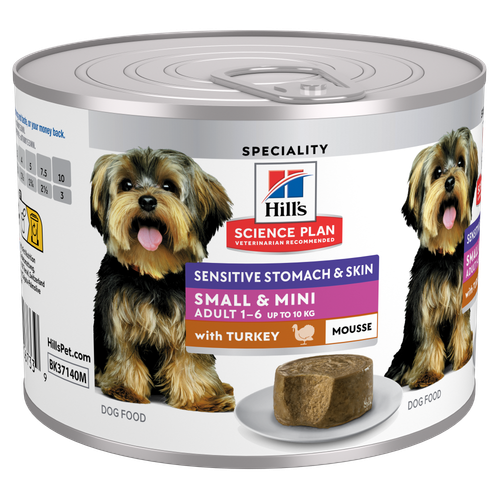
Hill's Science Plan Sensitive Stomach and Skin Small & Mini Adult Dog Food with Turkey is a complete premium pet food for small breed adult dogs aged 1–6 years. This deliciously soft mousse is enriched with ingredients that support digestive health & skin care.
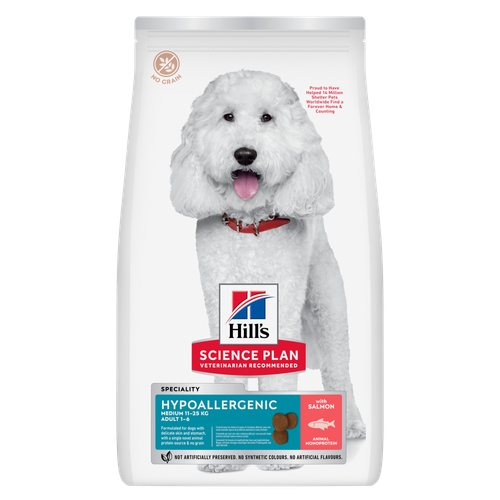
Science Plan Hypoallergenic Medium Adult dog food with Salmon is a gentle, science-led formula crafted for dogs with food sensitivities. Made with carefully selected, high-quality novel proteins and no grains, it’s tailored to minimise common triggers that can lead to skin and digestive discomfort.

Hill's Science Plan Adult Small & Mini Dog Food with Turkey is a complete premium pet food for adult small dogs from 1 year old that are prone to weight gain or slightly overweight. This deliciously smooth mousse is formulated to deliver the appropriate amount of energy to support weight maintenance in adult dogs.
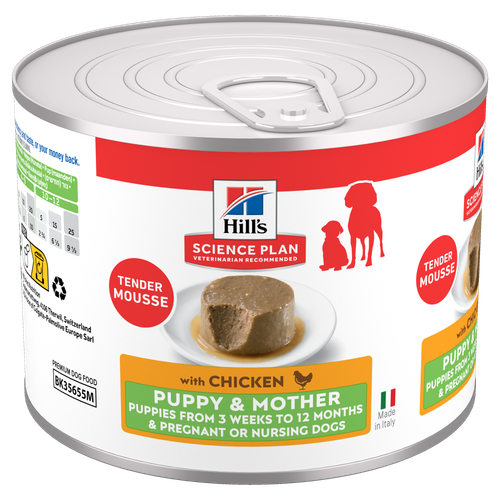
Hill's Science Plan Puppy & Mother Tender Mousse Dog Food with Chicken is a complete premium pet food for puppies and pregnant or nursing dogs. Formulated with chicken and other specially selected ingredients, including minerals and antioxidants to support gut health and optimal growth, it comes in a soft mousse texture they'll love.
Related articles

Dog obesity is a significant problem - learn more about helping your dog become trimmer and healthier through improved nutrition.

Puppy, kitten and pet dieting, cat nutrition and dog nutrition information from Hill's Pet

Learn about snake bites on dogs, including clinical symptoms to look for, what to do if you think your dog was bitten, and treatment & prevention options.

Discover the causes, signs, and treatments of kidney disease in dogs and find methods of supporting your dog's kidney health. Learn more at Hill's Pet South Africa.

Put your dog on a diet without them knowing
Our low calorie formula helps you control your dog's weight. It's packed with high-quality protein for building lean muscles, and made with purposeful ingredients for a flavorful, nutritious meal. Clinically proven antioxidants, Vitamin C+E, help promote a healthy immune system.
Put your dog on a diet without them knowing
Our low calorie formula helps you control your dog's weight. It's packed with high-quality protein for building lean muscles, and made with purposeful ingredients for a flavorful, nutritious meal. Clinically proven antioxidants, Vitamin C+E, help promote a healthy immune system.

